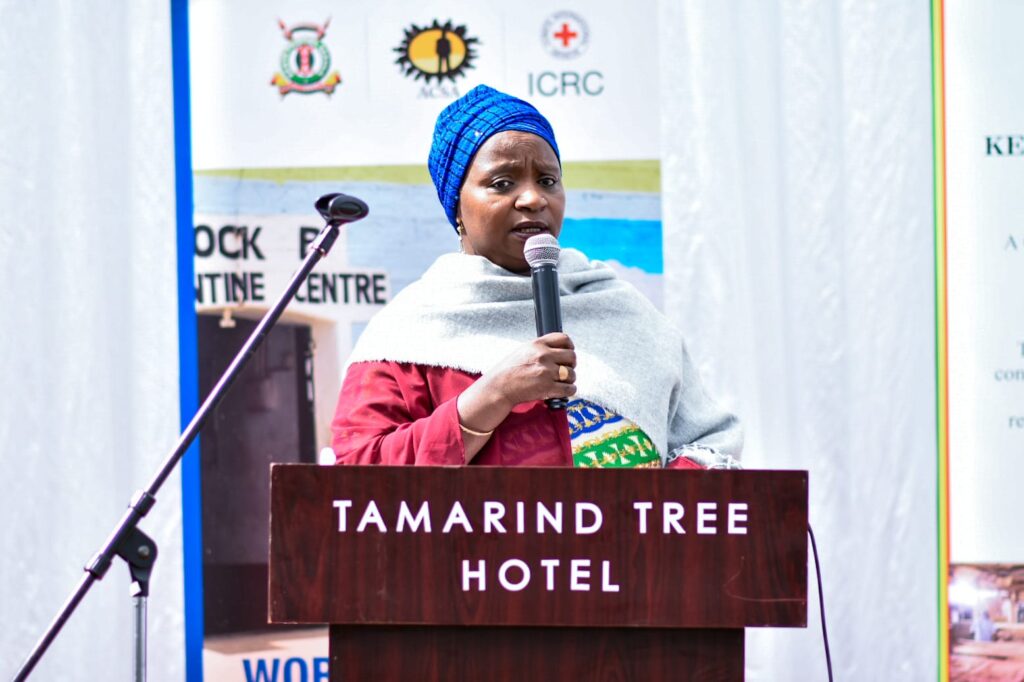Red Cross Moves to Tame Radicalisation in Prisons

By Martin masinde
The International Committee of the Red Cross is bracing itself to deliberate on ways of securing prisons to avoid radicalization in the wake of Violent Extremism.
This is in close collaboration with government to improve the quality of prisons infrastructure.
Dr Asha Mohamed is the CEO of the Kenya Red Cross. She CS was speaking Tuesday morning in the sidelines of a 4-day workshop on Prisons Infrastructure in Africa at Tamarind Tree Hotel, Lang’ata that brought together 12 English speaking African countries.
“This will provide a platform for an exchange of experiences, best practices and lessons learned in correctional facilities in infrastructure development and maintenance within the African region.
The head of the International Committee of the Red Cross Delegation, Daniel Gerard reiterated his commitment to improving African Correctional Services Association members.
The workshop that is being hosted by the Kenya Prisons Service (KPS) in collaboration with International Committee of the Red Cross (ICRC) and African Correctional Services Association (ACSA) will run from 7th-11th June 2022 with Kenya being the 3rd country to host it in the continent since its inception.
The regional workshop aims at providing a platform to facilitate the exchange of experiences, best practices and lessons learned in prison/correctional facilities, especially in infrastructure development and maintenance within the African region.
This meeting will reflect on previous editions held in Addis Ababa in November 2018 and Kigali 2020, with a focus on the revision of the draft “Prison Maintenance Guide” and its operationalisation.
Participants will be decision makers within the prison administration system with a role in infrastructure management. Representatives from Ethiopia, Gambia, Nigeria, Tanzania, Uganda, South Sudan, Mozambique, E-Swatini, Ghana, Zimbabwe, Somalia, Sudan and Kenya (hosts) are expected to attend.
“Prisons worldwide serve as homes to thousands of people in conflict with the law. It’s paramount to note that children accompanying their mothers to prison also spend their early years of life in these institutions. Many prisoners spend a long time in pre-trial detention before the conclusion of their cases. Prisoners’ vulnerability makes them dependent on policy makers who have a duty to ensure that they are protected and well catered for in the circumstances they find themselves.”
Adding that: “The era when prisons were viewed as warehouses where the wretched of the earth would be bundled for the rest of the society to live in tranquillity is gone. As prison officers, we have a responsibility to ensure that within institutions, exist functional systems and quality infrastructure to guarantee prisoners’ basic rights, their rehabilitation and conducive environment for wholesome development of children who accompany their mothers to prison.”
On his part Regional Head of the ICRC in Nairobi, Daniel O’Malley noted that: “Prisoners not only interact with other government structures, but also depend on the availability of medical services, psycho-social support and food supplies.
The common goal is that prison systems can continue as places that sustain life, remain respectful of the rights and dignity of prisoners while ensuring a suitable work environment or prison staff.”
The ICRC has for decades been involved in places of detention in Africa.
Increasingly, its efforts are shifting towards multidisciplinary and technical expertise sharing and support, as well as prison management capacity building.
In Kenya, the ICRC working together with the Kenya Red Cross Society (KRCS} has been working with Kenya Prisons to improve living conditions of inmates in the wake of COVID-19, built quarantine facilities and collaborated on establishing infection prevention measures to prevent infection spread.
The Kenya Red Cross has been offering phone call services to inmates to keep in touch with loved ones when family visits were suspended.





